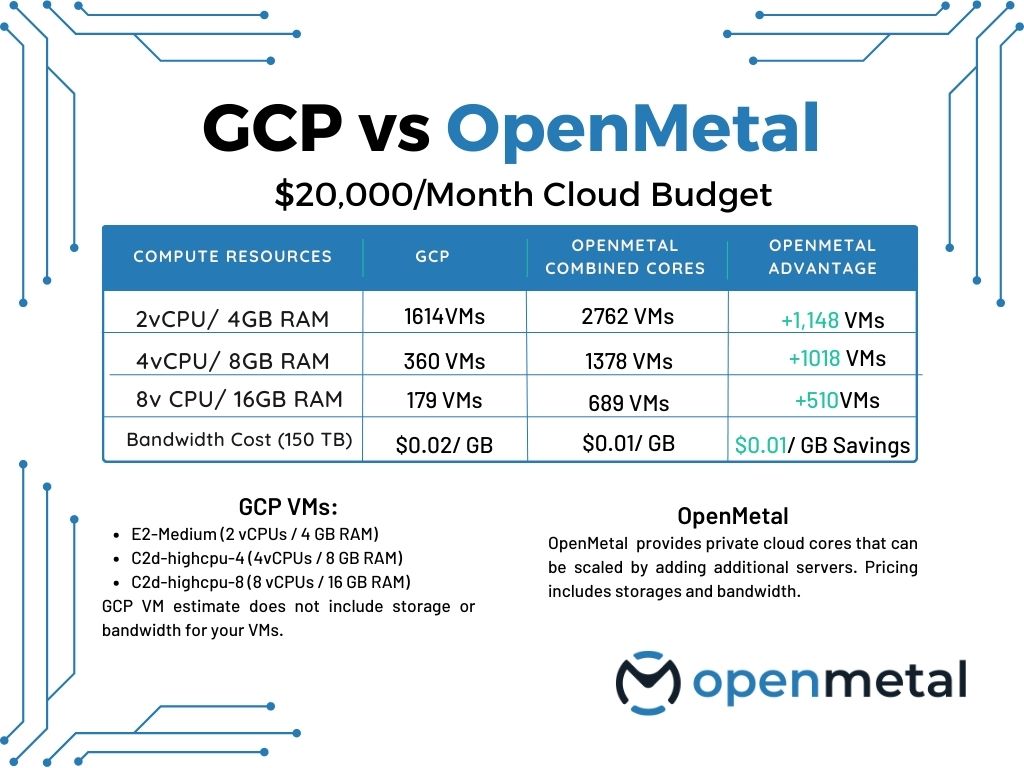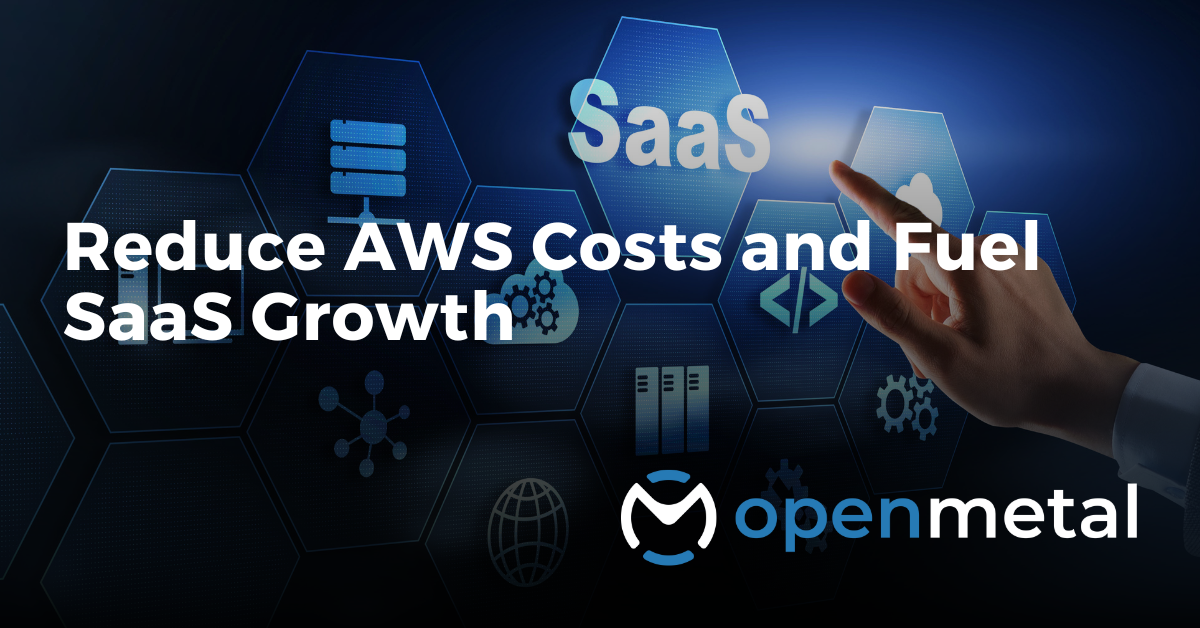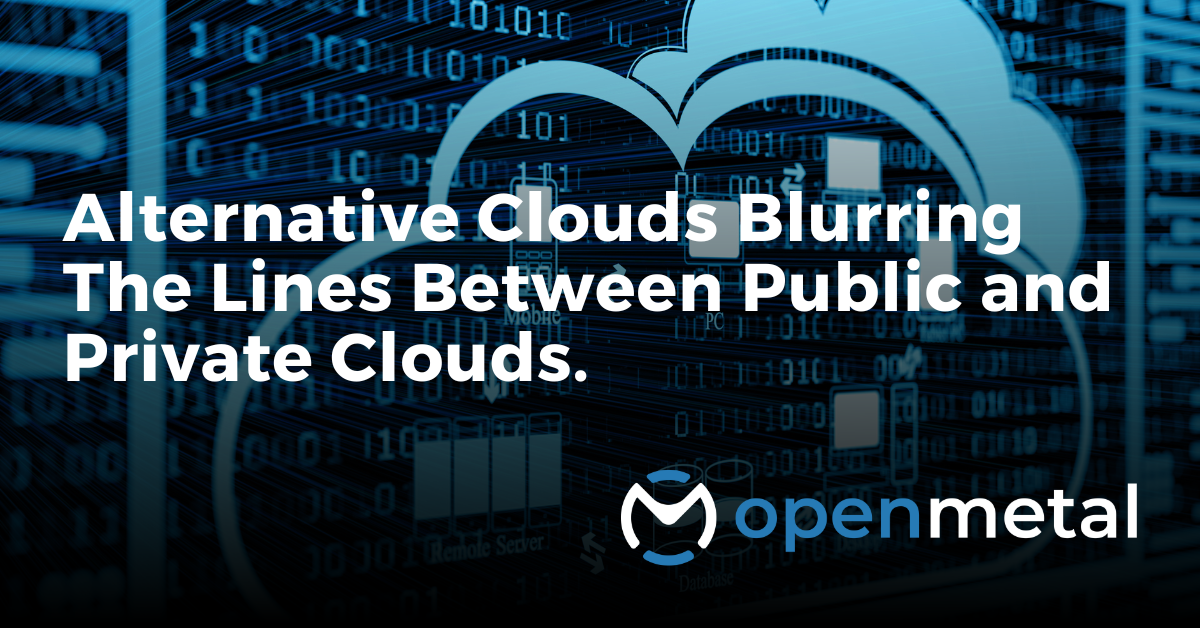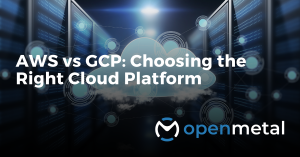
In this blog
Google Cloud Platform (GCP) is a prominent player in the cloud computing landscape. But, not without competition from other mega providers like AWS. With the recent rise in lower-cost alternative solutions available, anyone considering GCP may wonder if they are getting the best value for their dollar.
GCP, like every platform, has its pros and cons. And when considering committing to a cloud provider, it is best practice to thoroughly evaluate various options before committing.
In this article, we’ll delve into the advantages and disadvantages of GCP, and then highlight an alternative solution for businesses seeking flexibility and scalability.
Pros of Google Cloud Platform

Wide Range of Services
GCP offers various services including compute, networking, storage, big data, machine learning, and management. This allows their platform to fill the needs of diverse cloud computing requirements. This comprehensive suite of services ensures that businesses have the flexibility to choose the services that they need to build and run their applications.
 Global Reach
Global Reach
GCP has a global network of data centers, which means that your applications can be accessed from anywhere in the world. This is important for businesses operating in regions where regulations require local data centers, like the European Union. It also allows businesses to have multi-region redundancy or choose to have their workloads hosted in cheaper regions.
 Security
Security
When it comes to safeguarding your valuable data against unauthorized access, GCP provides a range of robust security features. These features are designed to meet the stringent demands of the tech industry. GCP offers a suite of security measures, including Identity and Access Management (IAM), Key Management Service (KMS), and Security Command Center (SCC), which collectively work to fortify your data protection strategy.
Let’s take a closer look at the strength and weakness of each of these security measures:
- Identity and Access Management (IAM) enables users to establish granular access controls and define permissions for users and resources. With IAM, you can precisely manage user identities, assign roles, and establish fine-grained access policies. This allows for the secure management of your cloud resources. IAM can be complex to configure and manage especially for businesses with intricate access control requirements. Users may also encounter Access Control Limitations ex: IAM roles are project-specific, so setting up access across multiple projects/organizations can be tedious.
- Key Management Service (KMS) enhances the security posture by providing a dedicated key management service within GCP. KMS enables you to generate, use, and manage encryption keys. This ensures that your sensitive data remains protected at rest and in transit. By leveraging KMS, you can strengthen the encryption of your data and exercise control over the encryption keys. Thereby mitigating the risk of unauthorized data exposure. With KMS, GCP manages the infrastructure for encryption key storage and usage. This arrangement may raise concerns for businesses that require full control and custody of their encryption keys, particularly in highly regulated industries or those with strict compliance requirements.
- The Security Command Center (SCC) acts as a centralized hub for monitoring and managing security threats within GCP. It offers comprehensive visibility into your cloud environment, enabling you to identify potential vulnerabilities, track compliance, and respond to security incidents effectively. SCC allows you to proactively detect and mitigate security risks. When leveraging GCP’s Security Command Center (SCC), beware that its monitoring coverage may not encompass all GCP services or third-party integrations. GCP users should conduct a thorough evaluation to ensure that SCC’s monitoring capabilities align with the unique characteristics and requirements of your virtual environment. This assessment will help determine if supplementary security tools or configurations are necessary to provide comprehensive security coverage across your infrastructure and integrations.
 Innovative Features
Innovative Features
GCP constantly introduces new features and enhancements, enabling businesses to stay at the forefront of technology. The comprehensive suite of tools offered by GCP empowers businesses to harness the power of data, deploy scalable infrastructure, and leverage machine learning capabilities, among other cutting-edge functionalities. In a fiercely competitive market, the ability to leverage the latest technologies is crucial for maintaining a competitive advantage. Now while it’s enticing to have all these features accessible, if you’re not using them it may not be economical to have a VM with them integrated as it is increasing your cloud cost which adds up when you are running thousands of VMs.
Cons of GCP
 Complex Pricing
Complex Pricing
GCP’s pricing structure can be intricate, making it challenging for businesses to accurately budget and manage their cloud computing costs. Because a VM doesn’t include everything you will need to run that VM such as storage and bandwidth, unless you know everything you will be using in your cloud quotes you find can be very misleading. This is problematic because the cloud user and the cloud procurement individual at most businesses are different individuals.
There are plenty of horror stories from users blindsided by massive unexpected cloud bills after cybersecurity incidents or misconfigurations of their Google Cloud. This story about a startup which usually spent $1,500/month on GCP receiving a $450,000 bill after their API key was compromised is just one case.
Before attempting to get a quote from GCP, you should meet with the end user(s) in your businesses and get precise requirements (or ranges) of: RAM, vCPU, storage, bandwidth, additional service addons, bursting predications, expectations for the workload to grow, etc. This will prevent you from being blind sided by your GCP bill. A detailed cloud assessment can streamline this process by providing a full evaluation of current infrastructure needs, enabling businesses to make more informed decisions about resources and cost optimization.
 Limited Support
Limited Support
GCP’s support options may be limited, potentially causing difficulties for businesses in need of prompt assistance. Limited support options can impact the speed and effectiveness of issue resolution. Businesses may experience delays in receiving the necessary technical guidance or troubleshooting assistance, which can have a direct impact on system availability, performance, and overall productivity.
To mitigate the potential challenges associated with limited support, businesses can consider implementing additional measures. These may include investing in internal expertise, leveraging community forums and knowledge bases, engaging with third-party support providers, or exploring professional services offered by GCP’s certified partner

Security Concerns
Some businesses handling sensitive data may have concerns about GCP’s security. Although GCP offers robust security features and implements industry-leading practices to safeguard customer data, no system can claim to be entirely immune to security risks. The ever-evolving nature of cybersecurity threats means that businesses must remain vigilant and proactive in their security measures. Above I already addressed some of the concerns with the security features so I will spare you the repetition here.
Alternative Solutions
OpenStack has revolutionized the cloud computing landscape with its open-source cloud solutions. For years, public cloud providers have dominated the market due to the complexities involved in building a cloud infrastructure, which often requires extensive time and resources that DevOps teams struggle to allocate. However, the emergence of OpenStack-based cloud providers like OpenMetal, coupled with the increasing pressure from CFOs on CTOs to reduce infrastructure costs, has compelled many IT decision-makers to reevaluate the viability of expensive public cloud options.
Wait a minute, did I just imply that public clouds are costly? I understand that I represent a private cloud provider with pricing starting at $500, while you can get a VM from GCP for $30. Please bear with me, as I explain how I arrived at the claim that public cloud is unjustifiably expensive.
My underlying assumption here is that most companies seeking to cut infrastructure expenses do not rely on a single VM, unless it happens to be a particularly large one. They typically utilize multiple VMs of varying sizes, which results in a monthly infrastructure expenditure of $20,000 or more. So, let’s focus on this lean scenario and compare the value of On-Demand OpenStack-Powered Hosted Private Clouds by OpenMetal with that of GCP.
In the context of a budget of $20,000, let’s explore what solutions GCP and OpenMetal, an alternative cloud provider, have to offer you for your cloud needs.
$20,000 / Month Budget

^All prices are estimates only and may be subject to change because of pricing adjustments and/or unique customer resources. Pricing obtained June 2023.
*GCP Config summary: Tenancy (Shared Instances), Operating System/Software: Free GCP instance (E2-medium, C2d-highcpu-4, and C2d-highcpu-8), 3 yr Committed Use Discounts applied, Internet Egress (0), Persistent Disk (Accompanying): Zonal SSD PD 0), Northern Virginia
As you can see, you can get significantly more resources with a private cloud vs public VMs for your budget. But at this point you may say hey, with public cloud I get a lot of applications that I can use for free without additional licensing costs. But, how many of those do you use? Chances are you use under 10, and if you looked at the licensing costs for only the apps you use, it will still be cost effective to use a private cloud.
So what exactly are you using your cloud for? If you are running Kubernetes workloads managed by another open source software like Rancher, do you really want to pay more? The Open Source community has an amazing range of free tools and resources to help you accomplish any task provided you have the expertise to set it up. And in the world where everyone is DIYing their training with YouTube tutorials from various tech experts around the globe, more engineers are diversifying their skillset.
Learn more about Alternative Clouds
Are You Open to New Ideas?
Pricing in this blog is a generalized scenario if you want to better understand your potential cloud savings, we can help. Schedule a consultation with our cloud team to do an initial assessment. It’s a no-pressure, complimentary discussion to understand your challenges and goals, review your current cloud bills, and identify any opportunities to reduce your spend. Reclaim capital that you can use to fund new grow, rather than continuing to overpay large public cloud providers.
More on the OpenMetal Blog…

Reduce AWS Costs and Fuel SaaS Growth
When SaaS providers consume large amounts of public cloud, a move to a hosted private cloud may reduce current AWS costs up to 50%. This can…Read More

Alternative Clouds Blurring The Lines Between Public and Private Clouds
Learn about alternative cloud solutions that combine the best of both public and private clouds and give your business greater flexibility…Read More

AWS vs GCP: Choosing The Right Cloud Platform
AWS and GCP are leading players in cloud computing, offering a wide range of services and attractive pricing. However, choosing the right platform requires understanding… Read More
Test Drive
For eligible organizations, individuals, and Open Source Partners, Private Cloud Cores are free to trial. Apply today to qualify.
Subscribe
Join our community! Subscribe to our newsletter to get the latest company news, product releases, updates from partners, and more.





































 Global Reach
Global Reach Security
Security Innovative Features
Innovative Features Complex Pricing
Complex Pricing Limited Support
Limited Support